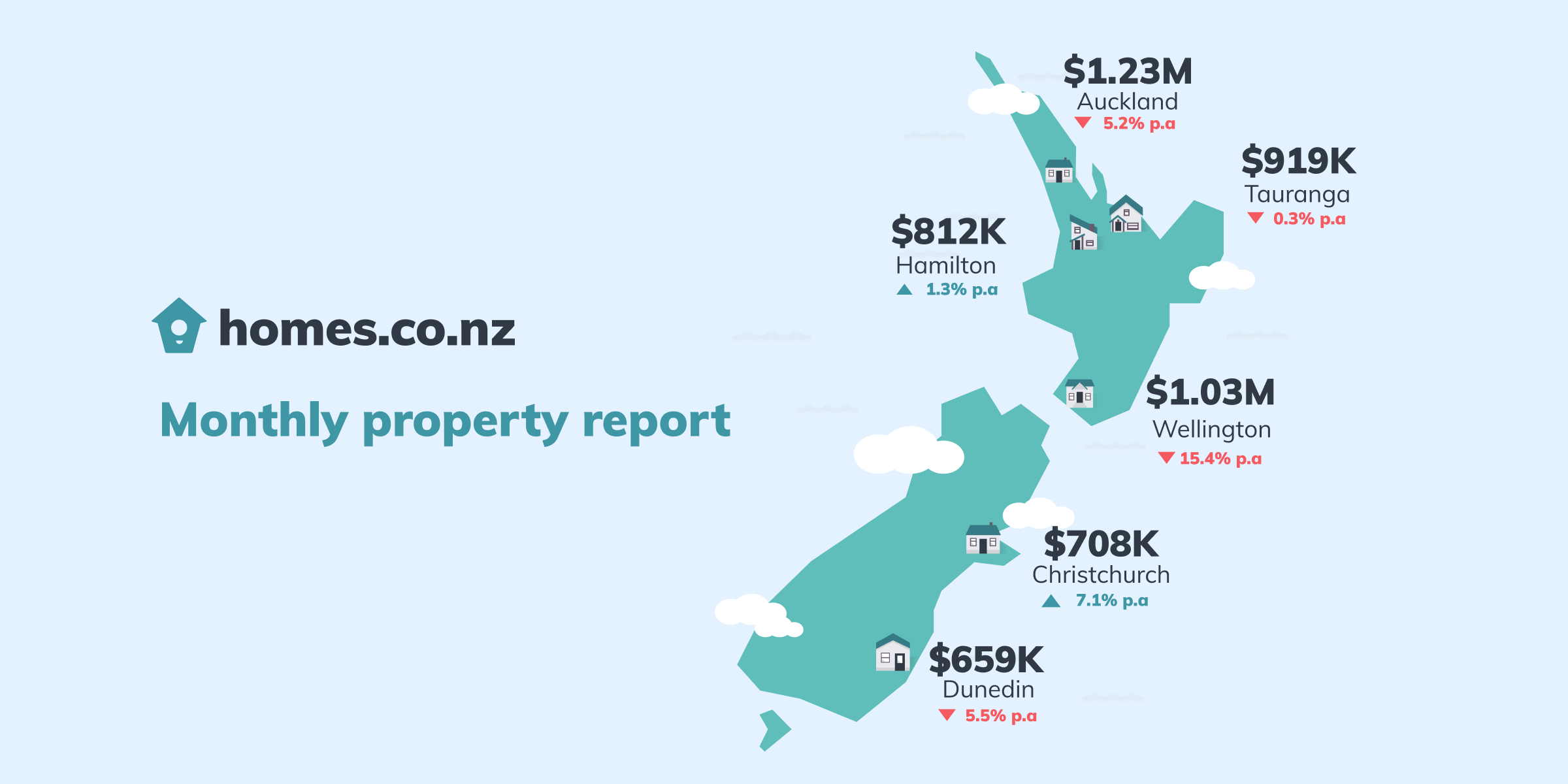When it comes to real estate trends and forecasts for 2021, the picture won’t be too different to 2020 according to industry experts who spoke to homes.co.nz. The most comforting prediction for buyers is that the market may be less frantic in the New Year – and as a result, house-price inflation could slow – but all signs are the market will continue to simmer.
Brad Olsen, a senior economist, and director at data collection firm Infometrics says if you’re looking to the government to cool the market then to look again.
“I think the industry, and most everyone else, is looking at the government and saying ‘they haven’t done much and don’t seem keen to do much’, so there doesn’t seem to be a huge amount of change coming,” says Brad.
“The government has sent letters to the Reserve Bank (about out-of-control house prices), but we’ve heard nothing on reform of the Resource Management Act (RMA), and little on additional infrastructure financing.
“So that does seem to suggest the government isn’t particularly serious when it comes to housing activity and making any of the actual fundamental changes that would be required. The government has had four years, and they haven’t really done much.”
What Brad does see is a shift in the types of homes being built, as he says support for city apartments is waning among lenders and buyers.
“We have seen this year that apartments have gone off the boil a little bit in terms of financing and people [not] wanting to live in a city,” he says.
“So [building] consent-wise, apartments haven’t been quite as rosy and I think you’ve seen that in some of the apartment pricing in Auckland.
“But what we have seen is a continued rise and sustained strength for townhouses, and I think that will probably remain a pretty hot area as we move through 2021.”
Stephen Barfoot, director of real estate firm Barfoot and Thompson, says 2021 will likely see a continuing trend of low-interest rates “making people’s mortgages more affordable”.
He says the return of loan-to-value (LVR) ratios, due to be re-introduced by the Reserve Bank in March, will have only a mildly restraining impact on house price inflation. The changes will mean investors will require a 30 percent deposit and first-time buyers a 20 percent deposit.
“I remember the Auckland housing market in particular was rising strongly late last year (2019) and early this year before Covid-19 came along and before the LVRs were temporarily removed,” says Stephen.
“There will be some uncertainty from investors regarding the moves the government and Reserve Bank might take to slow things down. But for every investor who might back off there is likely to be a first-home buyer eager to step forward.
“So, any new restraining moves may merely see a change in the mix of purchasers rather than an outright falling away of demand.
“How much might prices rise in 2021? If history has taught us anything, including the history of 2020, it is that no-one can reliably predict how much average house prices will change by – even two or three months out.”
Nick Goodall, head of research at property information firm CoreLogic, doesn’t think there will be any significant impact on the real estate market as a result of any new government policies in 2021.
“The government has hinted at tweaking policy, such as the RMA, which would be beneficial – but it will have little impact on the market during the year.
“Big tax changes have been ruled out by government, and industry is building homes as fast as it can. Interest rates will stay low, and overall the appeal of property ownership will remain. Property buying trends won’t change in 2021 given what we know at this stage.”
On the affordability front, Nick says that if the rate of house price inflation continues then affordability will continue to diminish as fewer people will be able to buy.
“So in 2021 you might see a slowing of house price growth,” he says. “The re-introduction of LVRs might impact investors, but we don’t expect that to have a significant reduction in demand.
“But, if there was more change than that, such as concerns about financial stability, then the RBNZ might raise the LVR deposit to 40 per cent for investors and that might lead to a slowing in demand.
“But we do not see a fundamental shift on the horizon leading to property values dropping away. That’s for sure.”
Stephen agrees that housing affordability is a challenge, “and I’m sure we all worry about whether our children will be able to afford to buy a property”.
“For better or for worse, New Zealand, and Auckland in particular, is a very attractive destination, and all cities in that same exclusive club are having to do much soul searching about affordability,” he says.
“I hope that we will be able to come up with solutions to create more housing supply without detracting from the attractiveness or character of our cities.
“In this respect, the increasing acceptance of urbanism is an exciting development, and there is much we can learn from cities overseas about how we can create a vibrant city and an attractive living environment without the problems of traffic congestion, pollution, and the loss of productive farmland.”
New Zealand is one of the most expensive country’s in the world when it comes to real estate, with median Auckland house prices being 10 times annual median income (outside Auckland it’s seven times). Where would Stephen suggest people buy their first home?
“When my wife and I arrived back in New Zealand in 2002, house prices had been through a strong period of growth, and my inclination was to rent while prices settled down,” he says.
“However, my father-in-law sat me down and told me that we should buy a house, and I am very grateful for that advice. At that time I was starting out in real estate sales, and my colleagues gave me a hard time about having paid too much – but in the end, it was the right decision.
“Life is about more than real estate though – so if I were advising my son, I would tell him to decide first which city he wanted to live in, then buy the best property he could afford. Having said that, ‘best’ is subjective, and to me ‘best’ is more about the location, land, and aspect. We all have our own priorities, but I would be advising him to buy the proverbial ‘worst house in the best street’.”
Brad at Infometrics says the regions offer some good propositions, perhaps helped by the increase of home-working in recent months.
“There’s a growing feeling that the regions actually offer some pretty attractive propositions,” he says.
“Broadly speaking places in Manawatu look attractive, there’s Wanganui, and the outskirts, or near to Palmerston North. They are certainly relatively hot at the moment.
“People seem to be giving Gisborne a pretty good go and there’s upper Waikato. So those are areas that immediately come to mind.”
As for future property listings, despite anecdotal chatter of low numbers of properties for sale, Nick at CoreLogic says the facts tell a different story.
“The flow of new listings coming to market is quite consistent year-on-year,” he says.
“The number of listings is quite okay, the problem is we have never really made up for the significant amount of sales that occurred across 2015/2016 and into 2017 that chewed into available stock.
“We don’t want to over-blow the Kiwis coming back story, it’s low interest rates that are allowing more people to buy a home and investors do not have anywhere else to put their money. There are lots of little things adding to the demand side and so prices are rising.”
Stephen agrees, saying the number of properties coming to the market has been relatively strong but they are selling quickly.
“That gives the perception of lower stock levels,” he says. “There are many reasons for this: record low interest rates, a labour market that’s fortunately much less weak than was feared, and with global uncertainty, people are switching to spending money at home and on their homes.
“Anecdotally, we are seeing people who have realised during lockdown that their living situation has not suited two parents each working from home, plus children trying to find a place to do their schoolwork. And the Kiwis returning from overseas to New Zealand’s ‘safe-haven’ all need somewhere to live.
“While the effects of these last two factors are small, in a global context the New Zealand property market is not large, and small changes in supply and demand will have an impact on the levels of available stock over time.
“All in all, 2020 has reinforced to me how lucky we are to be living here in Aotearoa New Zealand, and I for one would not want to be anywhere else right now.”


